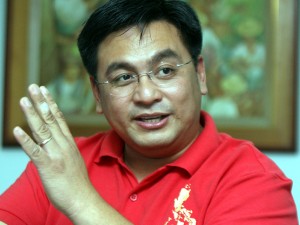Despite a P435-million grant from the European Union (EU) and another $10 million aid from the Japan International Cooperation Agency (JICA) for the Bureau of Customs’ information technology system, the BOC has been plagued by the “recurring problem of computer network slowdown and downtime,” adversely affecting the agency’s operations.
But BOC Commissioner Ruffy Biazon has expressed confidence the situation will improve early next year with the setting up of what the bureau calls “IPCS,” short for Integrated Philippine Computer System.
The BOC has allocated some P500 million for the program, which aims to overhaul the agency’s existing IT network.
In a text message, Biazon on Sunday told the Philippine Daily Inquirer “the project’s terms of reference are being finalized.”
“We are targeting the awarding of the contract sometime in the first quarter of 2013 before the election ban,” he disclosed.
According to Biazon, “the program budget will cover, among others, the upgrade of the current Customs clearance system, petroleum inventory system and the online x-ray inspection system.”
“It also aims to integrate the BOC monitoring systems and capabilities to plug loopholes in the process, thereby enhancing trade security and facilitation, as well as revenue collection,” he said, adding “the main thrust of the bureau should be to close all the loopholes that allow smuggling to happen.”
Once fully operational, the IPCS’ various features are expected to “facilitate faster transactions and tighter controls in the BOC,” according to Jaime Taborda, officer-in-charge of the BOC’s Management Information System and Technology Group.
“The recurring problem of computer downtime and slowdown in the bureau would eventually be addressed with the IPCS, which is part of our program to beef up the BOC’s hardware and software systems,” Taborda told a recent BOC media forum.
Aside from enhancing the BOC’s efficiency in its revenue collection program, the IPCS is also expected to help boost the bureau’s anti-smuggling campaign, he added.
For his part, lawyer Celso Tugday, the Port of Batangas’ deputy collector for assessment, said “the completion of the IPCS would greatly help the BOC’s frontline offices in both revenue collection and shipment monitoring.”
“Providing us with advance information on cargoes will enable us to enforce more efficiently our revenue collection and anti-smuggling initiatives,” he said, adding the IPCS “will allow us to prepare and address the necessary requirements covering all incoming and outgoing shipments.”
A check with BOC files disclosed that in 2008, the EU provided the finance department-attached agency with a five-year technical aid amounting to P435 million.
Sometime in April 2011, at least EU ambassadors to the country visited the BOC headquarters in Manila to check the facilities of the agency and the International Container and Terminal Services, Inc. that have benefited from the grant.
Citing the EU aid, the bureau said in a statement “the computerization of BOC operations are encouraging since it makes transactions easier, faster and more efficient.”
The program also “lessened interaction between BOC personnel and clients, resulting in lesser opportunities for corruption,” it also said.
The changes had “improved the image of the BOC, resulting in the lower rank it received in the Pulse Asia survey on the most corrupt government agencies from last year’s Rank 5 to Rank 7,” Deputy Commissioner Horacio Suansing was quoted as having told BOC reporters.
In mid-2009, then Customs Commissioner Napoleon Morales announced that JICA had approved a $10-million financial aid to help the bureau develop its own database.
Called the Philippine Customs Intelligence System, the project was “aimed at collating data regarding the correct valuation of all imported merchandise,” he explained.
Morales said the system would be the centerpiece of their plan to institute paperless and queue-less transactions at the bureau.
“Soon, the days of erring Customs agents in our international ports will be a thing of the past as brokers and importers need not go to the ports to transact business. This new system would easily solve our problem with undervaluation and technical smuggling, which will naturally increase our collection,” he added.
Undervaluation and technical smuggling refer to the practice of some unscrupulous importers and brokers who intentionally declare a lower value for their imported goods to avoid paying the correct taxes to the government.
The erring brokers and importers then bribe Customs examiners and appraisers to elude confiscation of their shipment.
Biazon has also expressed optimism the BOC “will have the Southeast East Nations’ single window in place by 2015.”
A single window system aims to facilitate trade among the 10-member Asean.
The system is “expected to increase efficiency through time and cost savings for traders in their dealings with government agencies in securing the requirements for moving cargoes across economic borders,” Biazon explained.
He noted that “Phase 1, or the setting up of a national window system is already in place while Phase 2, which includes preparations for the country’s interconnection with the Asean single window, is being bidded out.”
Aside from the Philippines, Asean also groups Indonesia, Malaysia, Singapore, Thailand, Brunei Darussalam, Vietnam, Laos, Cambodia, and Myanmar (formerly Burma).
